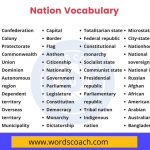Global politics vocabulary list with definitions
Global politics: The activities associated with the governance of a country or area, especially the debate between parties having power.
List of Global politics vocabulary
- Diplomacy
- Sovereignty
- Sanctions
- Treaty
- Ambassador
- Embargo
- Alliance
- Bilateral
- Multilateral
- Diplomatic Immunity
- Human Rights
- Soft Power
- Hard Power
- Summit
- Embassy
- International Law
- Mediation
- Sanction
- Peacekeeping
- Tariff
- Diplomatic Recognition
- Asylum
- Cabinet
- Centrist
- Chauvinist
- Community
- Consensus
- Constitution
- Critic
- Depose
- Dictatorship
- Diplomat
- Disarmament
- Domain
- Elite
- Espionage
- Gnash
- Illiteracy
- Imperialist
- Impose
- Infrastructure
- Intellectual
- Manipulate
- Massacre
- Monarchy
- Opposition
- Polls
- Rebellion
- Recession
- Regime
- Slum
- Throne
- Totalitarian
- Tyrant
- Utopia
- Veto
- Volunteer
- Vote
Global politics vocabulary definitions and example
Diplomacy
- Definition: The practice of conducting negotiations between countries.
- Example: Diplomacy was crucial in easing tensions between the two nations.
Sovereignty
- Definition: The authority of a state to govern itself or another state.
- Example: National sovereignty is a core principle of international law.
Sanctions
- Definition: Penalties or other means of enforcement used to prompt compliance with the law or rules, often in a political context.
- Example: The United Nations imposed sanctions on the country for violating international agreements.
Treaty
- Definition: A formal and binding agreement between two or more countries.
- Example: The peace treaty brought an end to the decades-long conflict.
Ambassador
- Definition: An official representative of a country’s government.
- Example: The ambassador worked tirelessly to improve relations between the two nations.
Embargo
- Definition: An official ban on trade or other commercial activity with a particular country.
- Example: The embargo on the country was lifted after significant political reforms.
Alliance
- Definition: A union or association formed for mutual benefit, especially between countries or organizations.
- Example: The two countries formed a military alliance to strengthen their defense capabilities.
Bilateral
- Definition: Involving two parties, especially countries.
- Example: The bilateral talks aimed at reducing trade barriers were successful.
Multilateral
- Definition: Involving more than two nations or parties.
- Example: The multilateral agreement was signed by over a dozen countries.
Diplomatic Immunity
- Definition: The privilege of exemption from certain laws and taxes granted to diplomats by the country in which they are working.
- Example: Diplomatic immunity allowed the ambassador to avoid prosecution for minor legal issues.
Human Rights
- Definition: Basic rights and freedoms that all individuals are entitled to.
- Example: The organization is dedicated to protecting human rights around the world.
Non-Governmental Organization (NGO)
- Definition: A not-for-profit organization that is independent from states and international governmental organizations.
- Example: NGOs often play a critical role in providing humanitarian aid during crises.
Soft Power
- Definition: The ability to attract and co-opt rather than coerce, using cultural or ideological means.
- Example: The country’s use of soft power, through cultural diplomacy, helped improve its global image.
Hard Power
- Definition: The use of military and economic means to influence the behavior or interests of other political bodies.
- Example: The country used hard power by imposing military force to achieve its political goals.
Summit
- Definition: A meeting between heads of government.
- Example: The summit between the two leaders was seen as a step towards peace.
Embassy
- Definition: The official residence or offices of an ambassador.
- Example: The embassy was heavily guarded during the protest.
International Law
- Definition: A body of rules established by treaty or custom that is recognized by nations as binding in their relations with one another.
- Example: Violations of international law can lead to sanctions and international condemnation.
Mediation
- Definition: Intervention in a dispute in order to resolve it.
- Example: The United Nations often provides mediation services to help resolve international conflicts.
Sanction
- Definition: A threatened penalty for disobeying a law or rule.
- Example: Economic sanctions were imposed on the country for its aggressive actions.
Peacekeeping
- Definition: The active maintenance of a truce between nations or communities, especially by an international military force.
- Example: United Nations peacekeeping forces were deployed to the region to help maintain order.
Embargo
- Definition: An official ban on trade or other commercial activity with a particular country.
- Example: The embargo was intended to pressure the government into making political reforms.
Tariff
- Definition: A tax or duty to be paid on a particular class of imports or exports.
- Example: The new tariffs on imported goods sparked a trade war between the countries.
Diplomatic Recognition
- Definition: The acknowledgment by one state of another state or government.
- Example: Diplomatic recognition is an important step in establishing formal relations between countries.
Asylum
- Definition: The protection granted by a nation to someone who has left their native country as a political refugee.
- Example: The political dissident sought asylum in a neighboring country.
Embassy
- Definition: The official residence or offices of an ambassador.
- Example: The embassy was the site of intense diplomatic negotiations.






nice post very informative